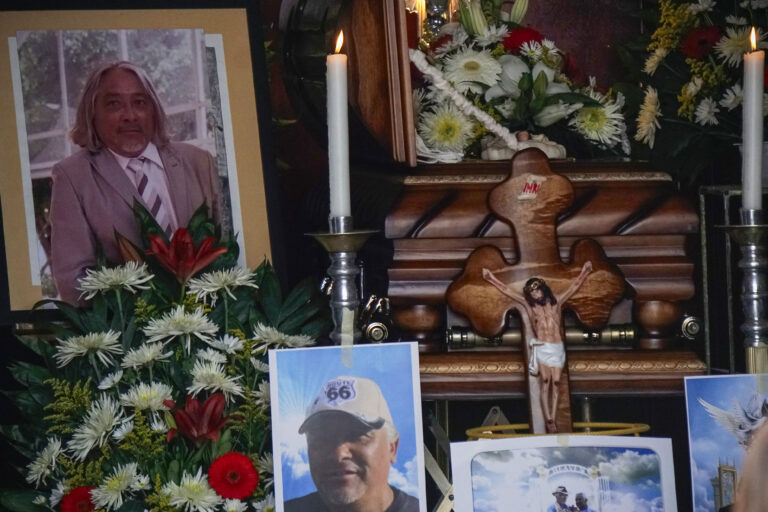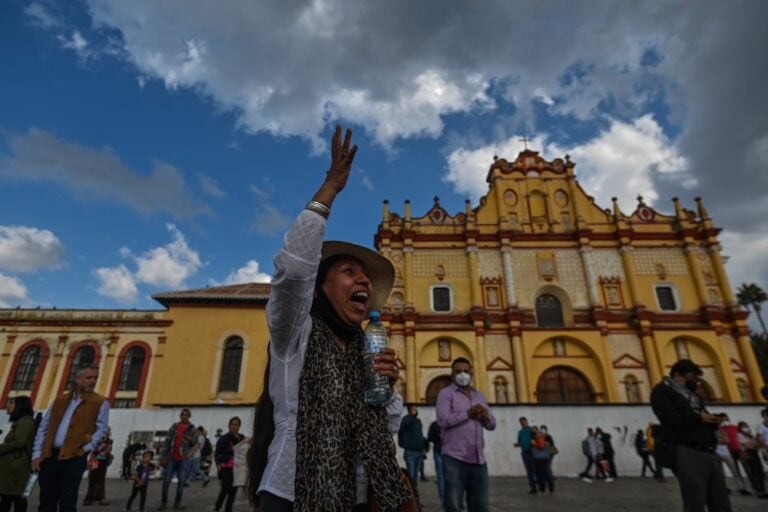(CENCOS/IFEX) – The following is a joint 14 February 2008 press release by AMARC-Mexico, ARTICLE 19-Mexico, CEPET, CENCOS and other organisations: Free expression organisations call for action on recent crimes against journalists So far in 2008, three journalists have been killed, one has gone into exile, and various have been attacked and threatened. There has […]
(CENCOS/IFEX) – The following is a joint 14 February 2008 press release by AMARC-Mexico, ARTICLE 19-Mexico, CEPET, CENCOS and other organisations:
Free expression organisations call for action on recent crimes against journalists
So far in 2008, three journalists have been killed, one has gone into exile, and various have been attacked and threatened. There has been negligible national attention given to these cases. The Mexican government is not fulfilling its commitment to safeguard free expression, allowing a culture of impunity to prevail.
The recent increase in offences against journalists is reprehensible. The first case of a journalist’s murder in 2008 was that of Francisco Ortiz Monroy, a reporter for “El Diario de México”, who was killed on 5 February in Ciudad Camargo, Tamaulipas. The circumstances of the crime remain obscure. Reporters Without Borders (RSF) notes that Tamaulipas is “favoured for the shipment of drugs” and one of the most dangerous states in the country, in which many journalists have been killed.
On 7 February, only two days later, Bonifacio Cruz Santiago, the director of the magazine “El Real”, and his son Alfonso Cruz Cruz, an editor for the same publication, were both killed in Chimalhuacán, in the state of Mexico, as they were waiting to see a local official. It is believed they may have been mistakenly been killed in the place of the official, but the investigation into the case has yet to produce results.
Carlos Huerta Muñoz, of the “Norte” newspaper of Ciudad Juárez, in Chihuahua, fled the country on 30 January, after receiving death threats. The day before, the newspaper’s management decided to strictly limit all reporting on drug-trafficking, for security reasons.
The director the morning daily “Voces de Veracruz”, Octavio Soto Torres, suffered minor injuries during an attack with firearms on 23 January in Pánuco, Veracruz. Although the state commission for the defense of journalists (Comisión Estatal para la Defensa de Periodistas) promised to increase security measures in the state, during a recent visit to the region ARTICLE 19 and CENCOS found that the promise remained unfulfilled.
In her recent visit to the country, UN High Commissioner for Human Rights Louise Arbour questioned the persisting restrictions on free expression in Mexico – including those imposed by media ownership concentration and by unpunished crimes against journalists. She urged the government to act on all the unsolved cases involving the murders of journalists and of women, and to do so with the same energy that has been brought to the battle against drug trafficking.
The undersigned reaffirm the obligation of states, as stipulated by the Inter-American Court of Human Rights, to prevent, investigate and punish all violations of human rights, not only those violations committed by state actors, but also those committed by private individuals or groups.
Another obligation of states, as stipulated in the American Convention on Human Rights ratified by Mexico on 24 March 1981, is that all levels of government are responsible for preventing, investigating and punishing all human rights violations. Principle 9 of the Declaration of Principles of Freedom of Expression indicates that the murder, kidnapping, intimidation, or threatening of journalists, as well as the destruction of media property, are all violations of people’s fundamental rights and severely limit freedom of expression. The murder, kidnapping, intimidation of and/or threats to social communicators, as well as the material destruction of communications media violate the fundamental rights of individuals and strongly restrict freedom of expression.
Given the above, we call on all levels of the Mexican government to halt and prevent crimes against journalists, and to investigate and punish the perpetrators and masterminds behind these crimes. We also urge the government to undertake efficient investigations into all such offences and to provide adequate physical and legal protection to journalists.
We also assert our consternation at the lack of attention given to these cases at the national level, especially given that these are offences not only against the work of journalists, but against society’s right to be informed.
On this point, we highlight also the promises made by the Mexican government to the Inter-American Commission on Human Rights in July 2007. The government then promised to study the question as to how it might make the issue of crimes against journalists a higher priority for the federal government – by strengthening the office of the special prosecutor for crimes against journalists (Fiscalía Especial de Delitos cometidos contra Periodistas, FEADP), for example. The government also promised to report back to the Commission on the progress made into cases of violations against journalists.
Signed,
Asociación Mundial de Radios Comunitarias (AMARC-México)
ARTICLE 19 – México
Centro de Periodismo y Ética Pública (CEPET)
Centro Nacional de Comunicación Social (CENCOS)
Fundación Manuel Buendía (FMB)
Libertad de Información-México A.C. (LIMAC)
Sindicato Nacional de Redactores de la Prensa (SNRP)
Red Mexicana de Protección a Periodistas y Medios de Comunicación


